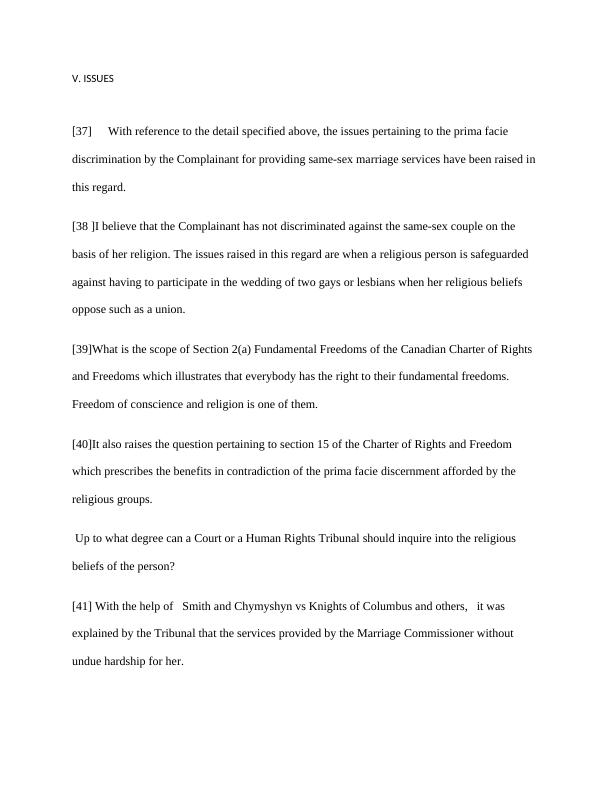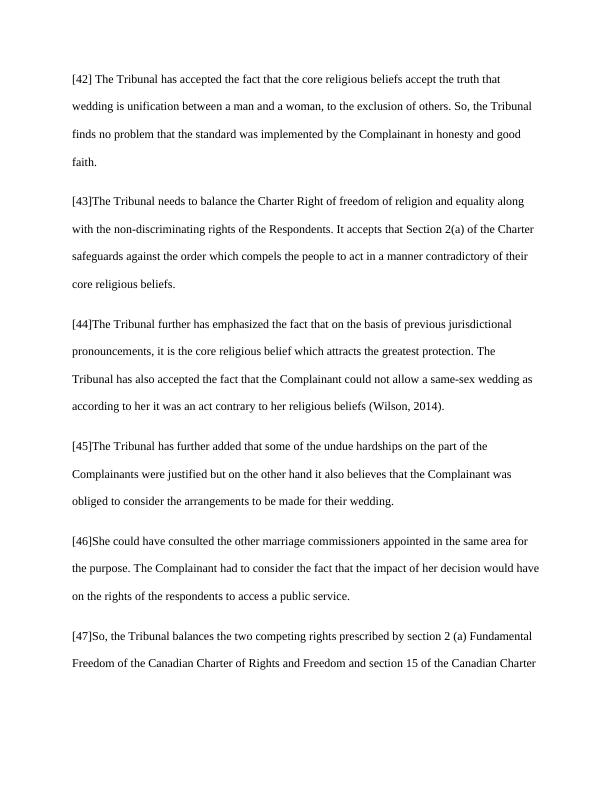Analysis of Issues and Decision in Discrimination Case for Same-Sex Marriage Services
Added on 2023-06-12
5 Pages1250 Words360 Views
V. ISSUES
[37] With reference to the detail specified above, the issues pertaining to the prima facie
discrimination by the Complainant for providing same-sex marriage services have been raised in
this regard.
[38 ]I believe that the Complainant has not discriminated against the same-sex couple on the
basis of her religion. The issues raised in this regard are when a religious person is safeguarded
against having to participate in the wedding of two gays or lesbians when her religious beliefs
oppose such as a union.
[39]What is the scope of Section 2(a) Fundamental Freedoms of the Canadian Charter of Rights
and Freedoms which illustrates that everybody has the right to their fundamental freedoms.
Freedom of conscience and religion is one of them.
[40]It also raises the question pertaining to section 15 of the Charter of Rights and Freedom
which prescribes the benefits in contradiction of the prima facie discernment afforded by the
religious groups.
Up to what degree can a Court or a Human Rights Tribunal should inquire into the religious
beliefs of the person?
[41] With the help of Smith and Chymyshyn vs Knights of Columbus and others, it was
explained by the Tribunal that the services provided by the Marriage Commissioner without
undue hardship for her.
[37] With reference to the detail specified above, the issues pertaining to the prima facie
discrimination by the Complainant for providing same-sex marriage services have been raised in
this regard.
[38 ]I believe that the Complainant has not discriminated against the same-sex couple on the
basis of her religion. The issues raised in this regard are when a religious person is safeguarded
against having to participate in the wedding of two gays or lesbians when her religious beliefs
oppose such as a union.
[39]What is the scope of Section 2(a) Fundamental Freedoms of the Canadian Charter of Rights
and Freedoms which illustrates that everybody has the right to their fundamental freedoms.
Freedom of conscience and religion is one of them.
[40]It also raises the question pertaining to section 15 of the Charter of Rights and Freedom
which prescribes the benefits in contradiction of the prima facie discernment afforded by the
religious groups.
Up to what degree can a Court or a Human Rights Tribunal should inquire into the religious
beliefs of the person?
[41] With the help of Smith and Chymyshyn vs Knights of Columbus and others, it was
explained by the Tribunal that the services provided by the Marriage Commissioner without
undue hardship for her.

[42] The Tribunal has accepted the fact that the core religious beliefs accept the truth that
wedding is unification between a man and a woman, to the exclusion of others. So, the Tribunal
finds no problem that the standard was implemented by the Complainant in honesty and good
faith.
[43]The Tribunal needs to balance the Charter Right of freedom of religion and equality along
with the non-discriminating rights of the Respondents. It accepts that Section 2(a) of the Charter
safeguards against the order which compels the people to act in a manner contradictory of their
core religious beliefs.
[44]The Tribunal further has emphasized the fact that on the basis of previous jurisdictional
pronouncements, it is the core religious belief which attracts the greatest protection. The
Tribunal has also accepted the fact that the Complainant could not allow a same-sex wedding as
according to her it was an act contrary to her religious beliefs (Wilson, 2014).
[45]The Tribunal has further added that some of the undue hardships on the part of the
Complainants were justified but on the other hand it also believes that the Complainant was
obliged to consider the arrangements to be made for their wedding.
[46]She could have consulted the other marriage commissioners appointed in the same area for
the purpose. The Complainant had to consider the fact that the impact of her decision would have
on the rights of the respondents to access a public service.
[47]So, the Tribunal balances the two competing rights prescribed by section 2 (a) Fundamental
Freedom of the Canadian Charter of Rights and Freedom and section 15 of the Canadian Charter
wedding is unification between a man and a woman, to the exclusion of others. So, the Tribunal
finds no problem that the standard was implemented by the Complainant in honesty and good
faith.
[43]The Tribunal needs to balance the Charter Right of freedom of religion and equality along
with the non-discriminating rights of the Respondents. It accepts that Section 2(a) of the Charter
safeguards against the order which compels the people to act in a manner contradictory of their
core religious beliefs.
[44]The Tribunal further has emphasized the fact that on the basis of previous jurisdictional
pronouncements, it is the core religious belief which attracts the greatest protection. The
Tribunal has also accepted the fact that the Complainant could not allow a same-sex wedding as
according to her it was an act contrary to her religious beliefs (Wilson, 2014).
[45]The Tribunal has further added that some of the undue hardships on the part of the
Complainants were justified but on the other hand it also believes that the Complainant was
obliged to consider the arrangements to be made for their wedding.
[46]She could have consulted the other marriage commissioners appointed in the same area for
the purpose. The Complainant had to consider the fact that the impact of her decision would have
on the rights of the respondents to access a public service.
[47]So, the Tribunal balances the two competing rights prescribed by section 2 (a) Fundamental
Freedom of the Canadian Charter of Rights and Freedom and section 15 of the Canadian Charter

End of preview
Want to access all the pages? Upload your documents or become a member.
Related Documents
LGST 230 The Canadian Legal System Assignmentlg...
|6
|1101
|161
